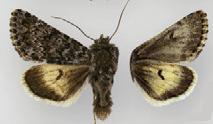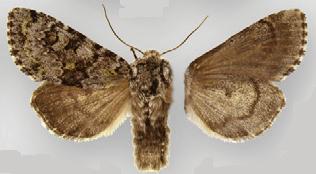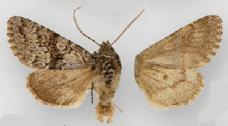
Lasionycta leucocycla is a moth of the family Noctuidae. It can be found in Scandinavia, Siberia and northern North America.

Lasionycta skraelingia is a moth of the family Noctuidae. It has a Holarctic distribution, occurring from Scandinavia to north-western North America. In North America this species is known from three specimens from Windy Pass, Ogilvie Mountains, Yukon.

Lasionycta taigata is a moth of the family Noctuidae. It occurs in open peatlands and fens in the taiga zone from Labrador, Churchill, Manitoba, and central Yukon, southward to northern Maine, northern Minnesota, and south-western Alberta.

Lasionycta fergusoni is a moth of the family Noctuidae. It is found from the southern Washington Cascades through British Columbia and Alberta to southern Yukon.

Lasionycta mutilata is a moth of the family Noctuidae. It is found from Oregon and Yellowstone National Park, Montana and Wyoming, northward to the Alaskan Panhandle and the Rocky Mountains of Alberta. It is absent from the Queen Charlotte Islands.

Lasionycta luteola is a moth of the family Noctuidae. It is found from northern Washington and south-western Alberta northward to south-western Yukon.

Lasionycta flanda is a moth of the family Noctuidae. It is found on the island of Newfoundland and at Goose Bay in eastern Labrador.

Lasionycta coracina is a moth of the family Noctuidae. It is found in the Richardson and British Mountains in northern Yukon, adjacent Northwest Territories, and Cape Thompson in north-western Alaska.

Lasionycta poca is a moth of the family Noctuidae first described by William Barnes and Foster Hendrickson Benjamin in 1923. It is found throughout the Rocky Mountains of Alberta, westward to the Coast Range in western British Columbia and southward in the Cascades to Okanogan County, Washington.

Lasionycta benjamini is a moth of the family Noctuidae. It is found in the Sierra Nevada of California and in the mountains of Nevada and Colorado.

Lasionycta subalpina is a moth of the family Noctuidae. It is found from southern Idaho and the Beartooth Plateau on the Montana-Wyoming border to Colorado and central Utah as well as in the Sierra Nevada of California.

Lasionycta subfuscula is a moth of the family Noctuidae. It is found from south-western British Columbia and south-western Alberta south to southern Oregon in the west and to southern Colorado and Utah in the Rocky Mountains.

Lasionycta subfumosa is a moth of the family Noctuidae. It is found from Victoria Island and Banks Island in the Northwest Territories and the Darby Mountains on the Seward Peninsula of Alaska.

Lasionycta quadrilunata is a moth of the family Noctuidae. It is found from south-central Alaska down the spine of the Rocky Mountains to Colorado.

Lasionycta carolynae is a moth of the family Noctuidae. It is found in the Ogilvie and Richardson Mountains in Yukon.

Lasionycta uniformis is a moth of the family Noctuidae. It is widely distributed in the mountains of western North America. It occurs from southern Yukon to northern California and Colorado, with an isolated population in eastern Quebec.

Lasionycta gelida is a moth of the family Noctuidae. It is known from three specimens from the British Columbia Coast Range.

Lasionycta discolor is a moth of the family Noctuidae. It occurs in the Rocky Mountains of Colorado and on the Beartooth Plateau in Wyoming.

Lasionycta sierra is a moth of the family Noctuidae. It occurs in the Sierra Nevada of California.

Lasionycta impingens is a moth of the family Noctuidae. It occurs from southern Yukon to Colorado.
This page is based on this
Wikipedia article Text is available under the
CC BY-SA 4.0 license; additional terms may apply.
Images, videos and audio are available under their respective licenses.